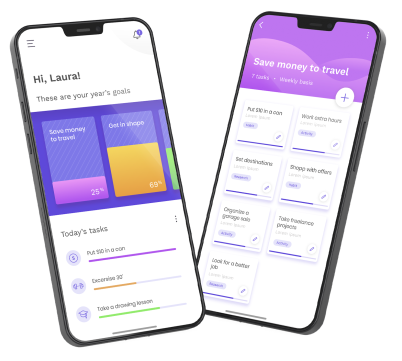User Research
Enhance your products through the implementation of User Research methodologies
Improve design, features, and feel of your product through the utilization of actionable user perspectives.
Amplify your success rate by 60% with User Research techniques
While one might perceive user or discovery research as costly and time-intensive, studies reveal that Lean User Research is the most effective approach to ensure that your products cater to the needs of your customers. A remarkable 83% of companies report project success after conducting User Research.
Validate your Idea
In essence, User Research methods provide invaluable insights that optimize product development at every stage, resulting in user-centric outcomes. User Research is not a one-time solution; successful organizations incorporate it as an integral part of a cyclical improvement process, including the following steps:

Validation
In-depth interviews, contextual studies, landing page speed feedback, competitor analysis, Big Data analytics

Design
In-depth interviews, contextual studies, usability testing, competitor usability testing, AB tests, card sorting

Post-launch
in-depth interviews, usability testing, click tests, surveys, Big Data analytics
By integrating User Research into the development process, organizations can pose relevant questions and gather critical information necessary for product development, enabling them to provide precise solutions to their audience’s needs.

User Research drives business success, and here's WHY
The inclusion of a discovery research phase enhances the likelihood of product success by nearly 60%. Statistics prove that projects incorporating User Research methods in their product development process significantly outperform those neglecting this crucial phase. According to research by NN Group, conducting discovery research also reduces the risk of failure by 75%, making user-centered research invaluable.
Empower your product design with cutting-edge User Research methods
Engage users to propel products and services towards excellence.
Mitigate the risk of market product failure
Generative research assists in identifying problems, target markets, and validating approaches to product design.
Concept validation prior to development
Identify assumptions versus reality in the early stages, before substantial budgets are allocated to development.
Cultivate product uniqueness
Observing users and competitors unveils insights necessary for developing unique solutions that fill market niches.
Enhance customer retention
User Research enables a deep dive into customer preferences, facilitating the cultivation of user loyalty.
Amplify conversion rates
Releasing customer-verified products significantly increases the chances of conversion and revenue growth.
Minimize customer churn
By testing and avoiding the mistakes made by competitors, user churn can be effectively reduced.
Expand user registration
Improve product-market fit, presentation, and usability to attract a larger user base.
Extend the user base
Listen, observe, and respond to user needs to offer solutions that cater to a broader audience.
Selecting appropriate User Research methods is crucial for customer satisfaction
Translate your profound understanding of market demand into user-centric products and services.
Extend the user base
Listen, observe, and respond to user needs to offer solutions that cater to a broader audience.
Competitor Analysis
Listen, observe, and respond to user needs to offer solutions that cater to a broader audience.
Usability Testing
Listen, observe, and respond to user needs to offer solutions that cater to a broader audience.

Learn the art of conducting successful User Research processes
Our team possesses extensive experience in applying User Research methods to deliver remarkable results for our clients. Read on to discover our step-by-step process, which can be implemented at any stage of the development cycle.
How do we operate?
Vision Assessment
We commence by reviewing, assessing, and gathering insights about your project vision.
Research Proposal
Based on the Vision Assessment, we provide a research plan tailored to your specific needs and capabilities.
Conduct Research
This phase entails conducting and documenting User Research while collaborating with you throughout the process.
Insights Presentation
In the final stage, we present you with analyzed research insights and product recommendations.
What exactly is User Research?
User Research aids brands in comprehending the preferences, behaviors, and needs influencing customer decisions regarding products and brands. This understanding is achieved through various feedback and response methods such as surveys, observation, and task analysis.
In simple terms, User Research methodology revolves around the improvement of products and services. Beyond fulfilling a function, products need to be usable. By employing experimental research processes, businesses can guide the design, development, and market launch of their products and services.
User Researchers work closely with other business functions, such as product designers, engineers, programmers, and strategy directors, throughout the entire product development and ideation process.
Qualitative and quantitative User Research methods
User Research methodology comprises two main types: qualitative research and quantitative research. These methodologies require different approaches and yield different outcomes, making them more or less advantageous for various projects.
Let's delve deeper into these methods.
Qualitative research primarily focuses on observing and gathering insights from non-numerical data points, such as customers’ opinions or expressed preferences
Qualitative Data
Qualitative data adds a human touch to what is commonly known as “big data.” It is a vital component of the User Research process as it helps understand the numbers derived from quantitative User Research through the lens of end users.
Quantitative User Research
Quantitative research aims to uncover facts, while qualitative research helps in understanding and interpreting those facts. Both these research methodologies are crucial pillars in User Research, aligning business vision with consumer perspectives. Therefore, it is recommended to employ both methodologies in the research process to gain comprehensive insights and enhance product design.
User Research tools
Numerous tools, activities, and actions can enhance the effectiveness and results of your User Research program.
Product analysis and user analysis allow for an examination of how products and users interact, assessing whether the product functions successfully and caters appropriately to user needs and preferences, including UI and user design elements.
Creating a stakeholder management plan is crucial to defining the involvement of each stakeholder, from developers and engineers to customers or investors, in the User Research process.
Competitive analysis UX is another tool that provides a deeper understanding of competitors’ performance. It helps uncover how their features work and the feedback they receive from their users. This analysis enables you to adjust and refine your own product strategy to design a superior solution. Understanding the competition is the first step towards surpassing it.
Additionally, user research can be deepened through the development of user personas, user scenarios, guerilla usability testing, and contextual study user research. These approaches contextualize your potential product or service within the market, allowing for accurate predictions of its performance among different market demographics compared to your competitors.
The role of a User Researcher
User Researchers assist in planning and executing research projects that provide design and development teams with a comprehensive understanding of how potential users interact with your own or your competitors’ services. Their research informs the incorporation of various functionalities and features into your products and services in the most optimal way for users.
Let’s delve deeper into these methods.
• Analytical mindset
• Inclusive and diverse
User Research is an ongoing process that involves identifying problems and proposing solutions with the ultimate goal of refining products. It requires constantly testing ideas and receiving feedback from users and customers, allowing for the resolution of any issues and the release of highly optimized products/services that meet the needs and preferences of users. The User Research methodology revolves around the improvement of products and services through experimental research processes, which guide the design, development, and market launch of products and services.
User Research methodology comprises two main types: qualitative research and quantitative research. Qualitative research primarily focuses on observing and gathering insights from non-numerical data points, such as customers’ opinions or expressed preferences, while quantitative research involves gathering data in the form of measurable numbers and statistics. Both these research methodologies are crucial pillars in User Research, aligning business vision with consumer perspectives. Therefore, it is recommended to employ both methodologies in the research process to gain comprehensive insights and enhance product design.
Numerous tools, activities, and actions can enhance the effectiveness and results of User Research, such as product analysis, user analysis, stakeholder management plan, competitive analysis UX, user personas, user scenarios, guerilla usability testing, and contextual study user research. The User Researcher’s role is to assist in planning and executing research projects that provide design and development teams with a comprehensive understanding of how potential users interact with products and services. Key skills for a User Researcher include an analytical mindset, inclusivity, diversity, and effective communication.

Start your project with us or take existing one to next level
Share your challenge and our team will support you on a journey to deliver a revolutionary digital product.









